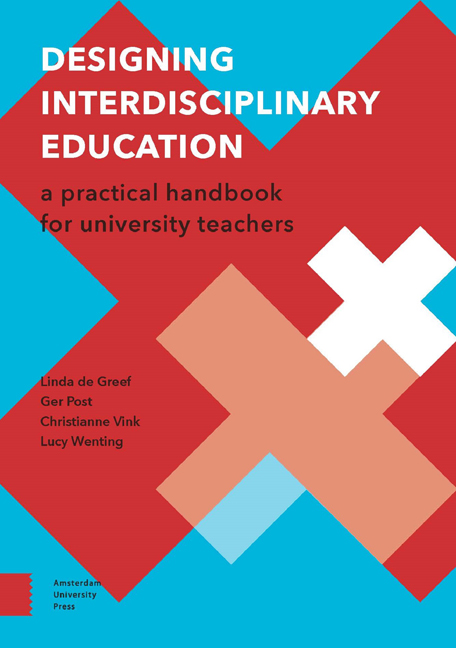Book contents
- Frontmatter
- Contents
- Acknowledgements
- 1 Introduction
- 2 An Overview of the Development Stages
- 3 Unravelling Interdisciplinary Understanding
- 4 Developing the Raw Sketch
- 5 Formulating Interdisciplinary Learning Outcomes
- 6 Embedding Integration in the Programme Design
- 7 Hiring and Engaging Faculty
- 8 Exploring the Teaching Philosophy and Didactic Methods
- 9 Assessment of Interdisciplinary Learning Outcomes
- 10 Interdisciplinary Teaching in Practice
- 11 Programme Assessment and Adjustment
- Appendices
- References
- Colophon
11 - Programme Assessment and Adjustment
- Frontmatter
- Contents
- Acknowledgements
- 1 Introduction
- 2 An Overview of the Development Stages
- 3 Unravelling Interdisciplinary Understanding
- 4 Developing the Raw Sketch
- 5 Formulating Interdisciplinary Learning Outcomes
- 6 Embedding Integration in the Programme Design
- 7 Hiring and Engaging Faculty
- 8 Exploring the Teaching Philosophy and Didactic Methods
- 9 Assessment of Interdisciplinary Learning Outcomes
- 10 Interdisciplinary Teaching in Practice
- 11 Programme Assessment and Adjustment
- Appendices
- References
- Colophon
Summary
‘The ultimate validation of a curriculum lies in its results; that is, did it help students achieve the desired outcomes?’
Ralph W. Tyler
After implementing an interdisciplinary programme, project or course, an important question arises: Does the new programme or course meet the students’ and teachers’ expectations? There is often no tradition to fall back on, especially for interdisciplinary initiatives, as courses are often unique in their themes and combination of disciplines. This chapter deals with how to find answers to such important questions.
Formal and informal assessment
The assessment or evaluation of a programme can have a range of purposes. It provides evidence as to whether the intended programme outcomes have been achieved and whether the programme is adding value. It also demonstrates accountability to current and future stakeholders such as students, their parents or employers. Universities are therefore asked to gather objective evidence and prove their competence, authority and credibility in order to obtain certification for the programme.
Key advice 26
Involve alumni of the programme
Parents and employers sometimes have questions about the added value of interdisciplinary programmes: Why should students choose for such a programme? Do students gain enough in-depth knowledge? What do you become as a result of following an interdisciplinary programme? To answer these kinds of questions, the Bachelor's programme in Natural and Social Sciences at the University of Amsterdam created a booklet with twelve stories of alumni whose work range from policymakers and business owners to careers within the university. The alumni explained how the training of interdisciplinary skills empowered them in their careers: they considered themselves to be communicative, creative in finding solutions, and concise. Alumni are important advocates for your programme. Their stories provide a good picture of the professions in which graduates might end up and of the added value of their education.
The procedures used for evaluation may range from informal to formal. The coffee corner is an excellent place to share experiences with students and colleagues. Teachers can also ask for feedback from the students at the end of a class to improve their teaching practice. Peer review from colleagues on teaching or assessing can also be quite valuable. This type of informal evaluation functions as a good interim check to learn how students have experienced their course and to learn from colleagues.
- Type
- Chapter
- Information
- Designing Interdisciplinary EducationA Practical Handbook for University Teachers, pp. 160 - 169Publisher: Amsterdam University PressPrint publication year: 2017



